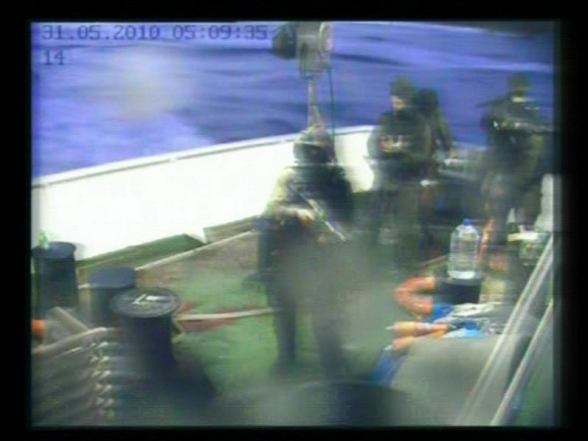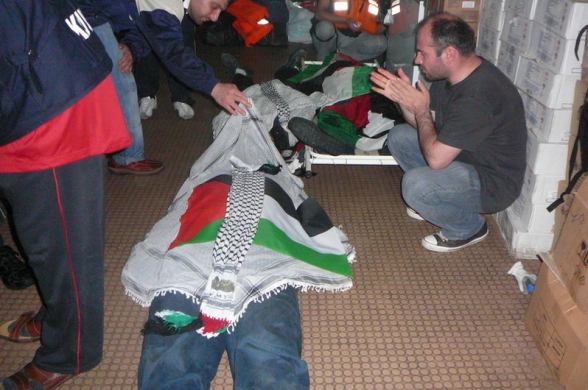Former Israeli navy commander panics at routine UK border questions
Reports from Ynet, Ha’aretz and Times of Israel.

Eli Marom, naval commander during Operation Cast Lead (1400 Palestinians killed) and the assault on the Mavi Marmara (9 Turkish citizens killed).
Former Navy chief Marom detained at Heathrow
Ynet learns commander of Israeli Navy during Operation Cast Lead and raid on Gaza-bound Marmara ship held for questioning upon arrival in UK
By Aviel Magnezi, Ynet news
October 14, 2013
Maj.-Gen. (res.) Eli Marom, who served as the commander of the Israeli Navy during Operation Cast Lead and during the raid on the Gaza-bound Mavi Marmara vessel, was held for questioning at around noon Monday at London’s Heathrow Airport upon his arrival in Britain, Ynet has learned.
Marom was held for a short time, during which he phoned the Justice Ministry in Israel.
The threat of being arrested in Europe has concerned senior Israeli military officers and politicians for a number of years now in light of lawsuits filed by pro-Palestinian organizations, although in most cases, at least in Britain, the measures taken against Israeli officials have been largely symbolic.
This threat appeared to have been reduced in 2011 when the UK amended its universal jurisdiction law, which allows private citizens to obtain arrest warrants for war crimes against foreigners visiting Britain. The law was amended to require the consent of the Director of Public Prosecutions in case a warrant was issued.
The amendment made it possible for Tzipi Livni to visit London that same year despite an arrest warrant issued against her for her role in Operation Cast Lead in Gaza. Livni served as foreign minister during the military operation in the Hamas -ruled territory.
In 2005, as he was landing in Britain for fundraising purposes, former IDF Central Command Chief Maj.-Gen. (res.) Doron Almog was informed by the Israeli ambassador in London about an arrest warrant against for alleged “war crimes” committed under his command in the Gaza Strip. Almog remained on the plane and flew back to Israel.
In another incident, Brig.-Gen. Aviv Kochavi, who in the past held command of the Gaza Division, was forced to avoid entering Britain and cancel his planned studies in the UK.
In May 2011, an additional incident occurred when the Prime Minister Benjamin Netanyahu’s military secretary, Brig.-Gen. Yochanan Locker opted out of joining Netanyahu on a state visit to Britain – also because of his involvement in Operation Cast Lead , when he served as the head of the IAF’s General Staff.
Former IDF Spokesperson Avi Benayahu revealed he had recently flown to Britain using a fake identity in wake of the de-legitimization campaign being waged against Israel.
Former Israel Navy chief complains after routine questioning at London airport
Israeli embassy says it was looking into the issue after Marom claimed he was detained; under British law, permission to arrest foreign citizens for war crimes is limited.
By Anshel Pfeffer, Ha’aretz
October 14, 2013
The former commander of the Israeli navy, Rear-Admiral (ret) Eliezer Marom, was questioned Monday morning at London’s Heathrow Airport immediately after landing in the United Kingdom, but his claims of being detained beyond routine seem to be unfounded.
After brief questioning, Marom was released and allowed to continue his visit. A spokesman for Israel’s embassy in London confirmed the details and said “we are looking into the issue right now.”
Following initial inquiries, none of the relevant British authorities, the Home Office, which is responsible for border controls, the London Metropolitan Police and the Foreign Office, are aware of Marom having been detained or questioned.
Israel’s Foreign Ministry is continuing to look into the incident but at this stage, it seems that Marom was under the mistaken impression that the routine questions he was asked at passport control at Heathrow Airport and the slight delay he experienced were actually an attempt to detain him over war crimes allegations.
Marom hastened to call the Justice Ministry in Jerusalem where a special team of lawyers was on call to deal with cases of senior Israeli officials who are charged or questioned abroad. A few minutes later it transpired there was no intention to detain him, and that Marom had nothing to be worried about. By that time, however, the story had already been leaked from the Justice Ministry to the Ynet website.
In September 2011, after continuing Israeli pressure, the British parliament amended the Universal Jurisdiction law which allows the arrest of foreign citizens accused of carrying out war crimes. According to the amended law, an arrest can only be carried out with the authorization of the Director of Public Prosecutions.
Israel’s concerns were raised following the 2005 incident in which Major-General (ret) Doron Almog was forced to remain on an El-Al plane in Heathrow for fear of being arrested once he stepped off the plane.
Pro-Palestinian activists had issued an arrest warrant against Almog for his involvement in the “targeted killing” of Hamas commander Salah Shehadeh in 2002.
Seven years later, Almog canceled an appearance at a fundraising dinner in London scheduled for April at the advice of the Israeli government, which once again feared Israeli state officials and military officers were at risk of being arrested in Britain for alleged war crimes, despite the amendment of the Universal Jurisdiction law.
Nonetheless, since the amendment, a number of senior Israel Defense Forces officers have visited London including Chief of Staff Lieutenant General Benny Gantz.

The attack on the Mavi Marmara was carried out by Israeli commandos in asssault boats and, above, dropped by helicopter. IDF photo.
International court preps for possible Marmara probe
ICC establishes three-judge procedural panel; prosecutor has yet to decide whether to launch a formal investigation
By Haviv Rettig Gur, Times of Israel
July 9, 2013
The president of the International Criminal Court, Sang-Hyun Song of South Korea, has assigned a three-judge panel to examine procedural requirements for moving forward with a war crimes suit against Israel over the 2010 raid on a flotilla to Gaza.
Nine Turkish passengers were killed on the flotilla’s flagship, the Mavi Marmara, and several Israeli commandos were badly wounded in clashes after they attempted to commandeer the ship. The flotilla was attempting to break the Israeli naval blockade of the Hamas-ruled Gaza Strip.
While the ICC emphasized in a statement that the move was “a procedural matter only, and is not the beginning of an investigation,” the appointment puts in place the legal apparatus for moving forward with an investigation. The power to launch that investigation resides with the ICC prosecutor, Gambian attorney Fatou Bensouda, who launched “a preliminary examination” in May to determine “whether the criteria for opening an investigation are met,” she told Reuters at the time.
The examination was opened following a complaint filed on May 14 by the Muslim African island nation of Comoros, where the Mavi Marmara was registered, through the Istanbul-based law firm Elmadag, which represents the Marmara victims’ families.
Comoros’ complaint references Article 12(2)(a) of the Rome Statute that established the court, “which allows the ICC to exercise its jurisdiction over crimes committed on board a vessel, if the State of registration of that vessel is a State Party to the ICC,” the ICC noted. Israel, like the US, Russia and others, is not a state party to the ICC, but Comoros is.
The new panel is composed of Silvia Fernández de Gurmendi of Argentina, Hans-Peter Kaul of Germany and Christine Van den Wyngaert of Belgium.
The Mavi Marmara was part of a flotilla that sailed toward Gaza to try to break Israel’s naval blockade. The Israeli Navy intercepted all other vessels in the flotilla without resistance, but commandos were attacked with metal bars and clubs when they boarded the Marmara on May 30, 2010. During the ensuing melee, the commandos opened fire and killed nine passengers.
The incident exacerbated already strained diplomatic ties between Israel and Turkey. In March, in a phone conversation arranged during the final moments of US President Barack Obama’s visit to Israel, Prime Minister Benjamin Netanyahu apologized to his Turkish counterpart, Recep Tayyip Erdogan, for operational errors made in the raid and promised compensation for the victims and their families. Negotiations are said to be nearing completion.
“If this will not bring about results, we’ll know that certain countries are influencing the court,” Ramadan Ariturk, one of the families’ attorneys, told the Anatolia Turkish news agency.
Previous attempts to engage prosecutors in an investigation of Israel have stalled due to lack of jurisdiction.
The ICC has jurisdiction over its members, over cases that are referred to it by the UN Security Council and over events that take place on the territory of member states. In the filing, lawyers from the Istanbul-based Elmadag argued that events that took place on the Mavi Marmara should be considered as having occurred on the territory of Comoros.
The Associated Press contributed to this report.
Below, casualties of the attacks on the Mavi Marmara. Photos posted by Occupied Palestine


